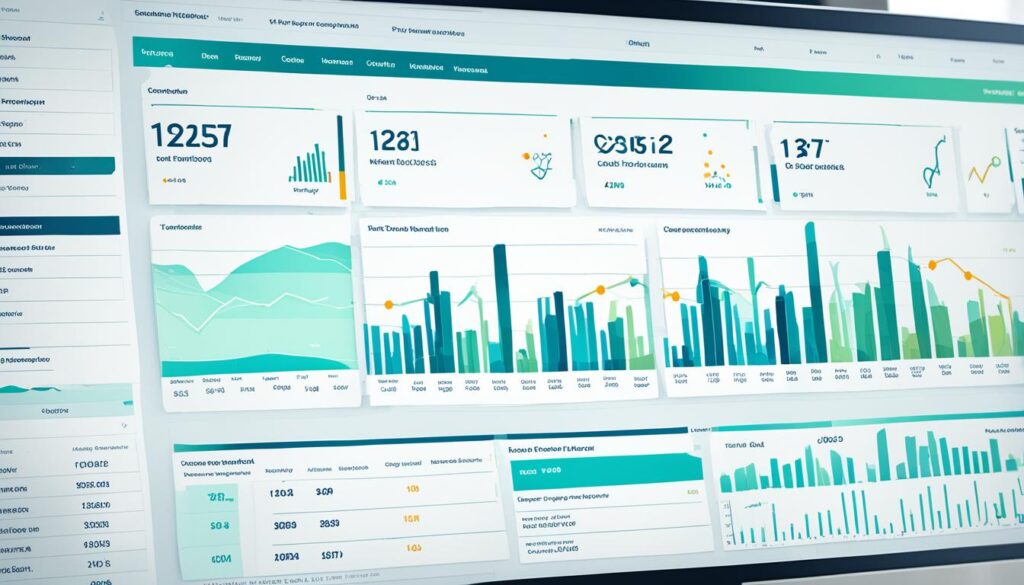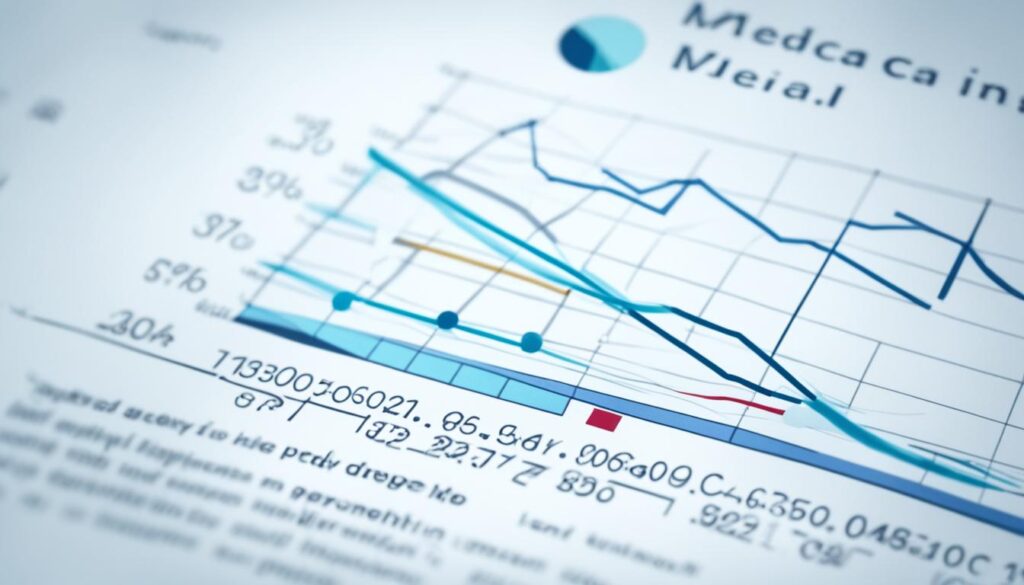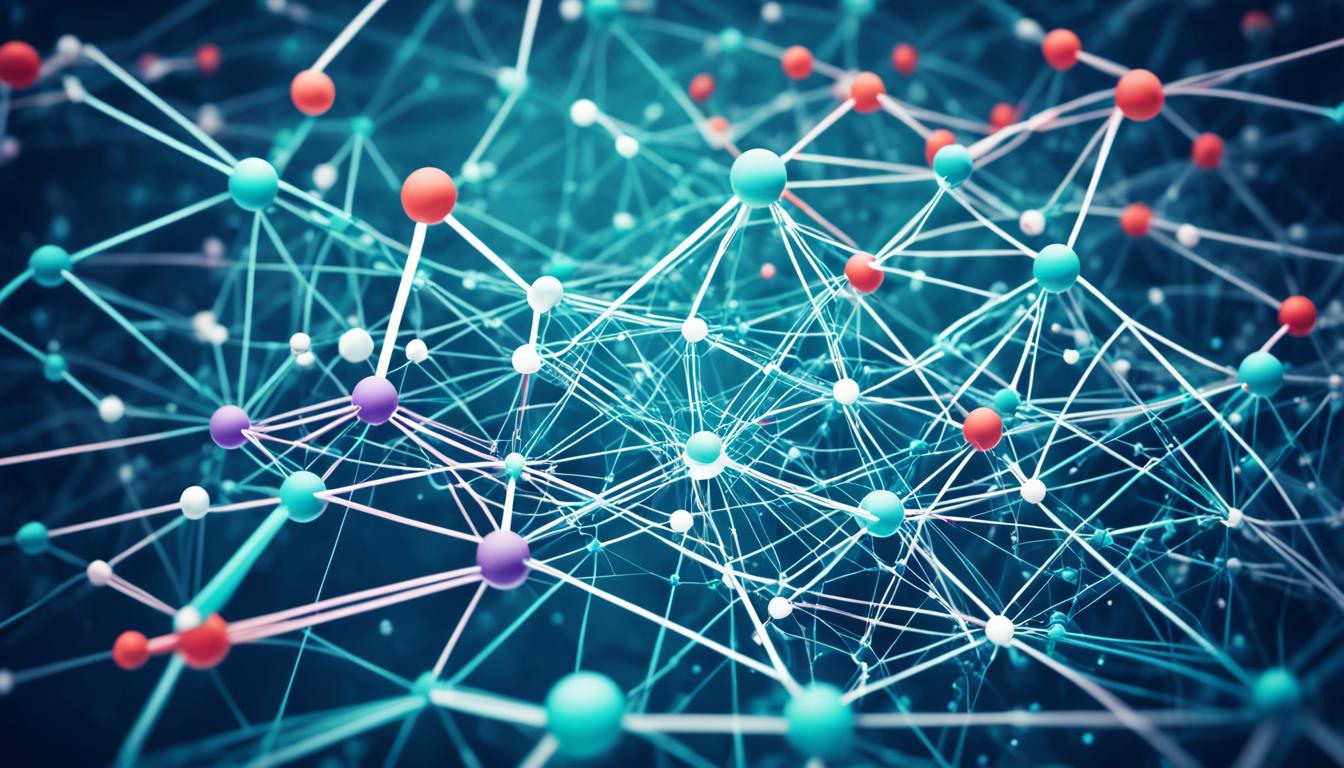In today’s fast-paced healthcare industry, data analytics is playing a vital role in transforming the way patient care is delivered and operations are streamlined. With the introduction of Big Data Analytics (BDA), healthcare organizations are harnessing the power of vast amounts of structured and unstructured data to make informed decisions and drive data-driven healthcare.
By utilizing data mining techniques and sophisticated analytics tools, healthcare providers can analyze patient data, manage health records effectively, and even predict outcomes to enhance the overall quality of care. From treatment strategies to health management and predictive modeling, data analytics is making a significant impact on every aspect of the healthcare industry.
Key Takeaways
- Data analytics is revolutionizing the US healthcare industry, optimizing patient care and streamlining operations.
- Big Data Analytics combines structured and unstructured data to provide valuable insights and predictive models.
- Data-driven healthcare enables personalized medicine, early disease detection, and improved diagnosis.
- Data science applications in healthcare include drug discovery, remote patient monitoring, and operational efficiency.
- The future of healthcare lies in continued research and investment in data science for better patient outcomes.
The Benefits of Big Data Analytics in Healthcare
The use of structured and unstructured data (Big Data) analytics in medical facilities offers numerous benefits. Structured data, with a predetermined schema, allows for extensive analysis and comes in various forms. Unstructured data, on the other hand, does not fit into the typical data processing format and requires specific technology and methods to transform it into value.
Integrating both types of data can provide significant value to healthcare organizations. By utilizing structured data, healthcare professionals can gain valuable insights into patient demographics, medical history, treatment outcomes, and more. This information can aid in improving patient care, identifying patterns and trends, and making data-driven decisions for better healthcare outcomes.
Unstructured data, such as clinical notes, imaging reports, and patient feedback, holds immense untapped potential. Although challenging to process, advanced technologies like natural language processing (NLP) and machine learning can unlock the hidden value within unstructured data. These techniques enable the extraction of meaningful information, including sentiment analysis, key phrases, and context, which can be used to enhance patient engagement, improve treatment protocols, and identify new avenues for research and development.
The Power of Predictive Models in Healthcare
One of the most significant advantages of big data analytics in healthcare is the ability to develop predictive models. These models leverage historical data to forecast future events, outcomes, and trends. Predictive models have the potential to revolutionize healthcare by enabling proactive interventions, personalized medicine, and resource allocation.
With the help of predictive models, healthcare organizations can identify high-risk patients who are likely to develop chronic conditions or experience adverse events. This early identification allows healthcare providers to intervene with targeted preventive measures, reducing hospitalizations and improving patient outcomes.
Furthermore, predictive models can support clinical decision-making by providing insights into the most effective treatment plans for specific patient populations. By considering a patient’s unique characteristics, medical history, genetic data, and lifestyle factors, healthcare professionals can tailor treatments to maximize efficacy and minimize side effects.
Predictive models also play a crucial role in resource allocation and operational efficiency. By analyzing patient demand, historical data, and forecasting future needs, healthcare organizations can optimize staff scheduling, bed availability, and supply chain management. This proactive approach minimizes inefficiencies, reduces costs, and improves overall patient satisfaction.

In conclusion, the benefits of big data analytics in healthcare are vast and transformative. By harnessing the power of structured and unstructured data, healthcare organizations can make data-driven decisions, enhance patient care, and unlock new insights for innovation. The development and utilization of predictive models provide a vision for the future of healthcare, where personalized medicine, proactive interventions, and operational efficiency are the norm.
Challenges and Opportunities in Data-driven Healthcare
The healthcare industry is confronted with numerous challenges brought on by an aging population and declining fertility rates. These pressing issues are further compounded by the ongoing demands of the COVID-19 pandemic. To effectively address these challenges, healthcare providers must embrace data-driven approaches that leverage the power of analytics and technology.
By adopting data-driven healthcare solutions, the industry can transition towards a patient-centered model that fosters proper health attitudes, disease prevention, and personalized medicine. This shift holds the potential to revolutionize patient care and improve overall outcomes.
Data-driven systems enable healthcare organizations to capitalize on quick learning opportunities and make informed, data-driven decisions. This empowers medical professionals to deliver better personalized predictions, enhance safety measures, and optimize healthcare interventions for improved patient outcomes.
Benefits of Data-driven Decision-making:
- Precise Predictions: Leveraging vast amounts of healthcare data allows for the generation of accurate predictions and forecasts for disease prevalence, treatment effectiveness, and healthcare resource allocation.
- Improved Safety: Data-driven approaches enable the identification of risks and adverse events, allowing healthcare providers to implement targeted safety measures and enhance patient well-being.
- Effective Interventions: By relying on data analytics, healthcare professionals can tailor treatment plans to individual patients, ensuring more precise interventions and improved outcomes.
Opportunities for Data-driven Healthcare:
“Data-driven healthcare has the potential to transform the way we approach patient care. By harnessing the power of analytics and technology, we can optimize treatment strategies, better allocate resources, and ultimately improve patient outcomes.”
— Dr. Emily Wilson, Chief Medical Officer at DataHealth Solutions.
The remarkable potential of data-driven healthcare offers opportunities for innovation and improved operational efficiency. Realizing these opportunities include:
- Enhanced research and development capabilities.
- Advanced diagnostic algorithms for early disease detection.
- More effective drug discovery processes.
- Remote patient monitoring for improved care coordination.
- Public health surveillance for preemptive interventions.
As the healthcare industry embraces data-driven decision-making, it is crucial to address challenges such as privacy concerns, data interoperability, and potential biases in algorithms. Setting appropriate regulations and policies will promote responsible data usage and ensure equitable access to healthcare services.
Applications of Data Science in Healthcare
Data science has revolutionized the healthcare industry and has numerous applications in improving patient care and advancing medical research. Let’s explore some of the key areas where data science is making a significant impact:
1. Personalized Medicines
Data science plays a vital role in the development of personalized medicines. By analyzing extensive patient data, including genetic information, lifestyle factors, and medical history, researchers can identify specific biomarkers and genetic variants associated with different diseases. This information enables the creation of tailored treatment plans that are more effective and have reduced side effects.
2. Early Disease Detection
Data science, combined with machine learning algorithms, enables early disease detection by identifying patterns and anomalies in large datasets. By leveraging this technology, healthcare professionals can detect diseases at their earliest stages, even before symptoms appear. This early detection allows for timely intervention and improved treatment outcomes.
3. Improved Diagnosis and Treatment
Data science facilitates improved diagnosis and treatment by extracting insights from diverse sources such as electronic health records, clinical trials, and scientific literature. Through advanced analytics and machine learning algorithms, healthcare providers can identify valuable information, such as disease patterns, treatment effectiveness, and novel therapies. This knowledge enhances diagnostic accuracy and supports evidence-based decision-making for better patient outcomes.
4. Drug Discovery and Development
Data science is accelerating the process of drug discovery and development. Through the analysis of vast amounts of molecular and clinical data, researchers can identify potential drug targets, predict drug efficacy, and optimize treatment regimens. This data-driven approach streamlines the development process, leading to more efficient and effective therapies.
5. Remote Patient Monitoring
Remote patient monitoring, enabled by data science, allows healthcare professionals to monitor patients’ health conditions remotely. By collecting continuous data from wearable devices, sensors, and telehealth platforms, healthcare providers can track vital signs, detect abnormalities, and intervene promptly. This technology enhances patient care, reduces hospital visits, and improves overall patient satisfaction.
6. Public Health Surveillance
Data science contributes to public health surveillance by analyzing vast amounts of data from various sources, including social media, electronic health records, and disease registries. This enables early detection and monitoring of infectious disease outbreaks, identification of high-risk populations, and implementation of targeted interventions to prevent the spread of diseases.
7. Operational Efficiency and Research and Development
Data science optimizes healthcare operations by analyzing operational data, identifying bottlenecks, and streamlining workflows. Additionally, research and development in healthcare benefit from data science by leveraging advanced analytics and predictive modeling to identify new research areas, prioritize research efforts, and allocate resources effectively.

Summary:
Data science has transformed the healthcare industry, offering groundbreaking applications such as personalized medicines, early disease detection, improved diagnosis, drug discovery, remote patient monitoring, public health surveillance, operational efficiency, and research and development. By harnessing the power of data analytics and machine learning, healthcare professionals can improve patient outcomes, drive innovation, and pave the way for a more efficient and effective healthcare system.
Conclusion
Data science has emerged as a game-changer in the healthcare industry, offering immense potential to revolutionize operations, enhance patient care, and drive innovation. With the increasing volume of healthcare data and advancements in technology, the future of healthcare holds both challenges and opportunities.
While the application of data science in healthcare brings promising prospects, concerns such as data privacy, interoperability, and bias must be addressed. The implementation of proper regulations and policies can effectively mitigate these challenges and ensure the responsible use of data.
Through continued research and investment in data science, the future of healthcare looks bright. Improved diagnoses, personalized treatments, cost optimization, and better patient outcomes are within reach. The healthcare revolution brought forth by data science presents us with a unique opportunity to transform the industry, making healthcare more efficient, accessible, and tailored to individual needs.
FAQ
What is Big Data Analytics and how is it transforming the healthcare industry?
Big Data Analytics (BDA) is the use of structured and unstructured data to optimize patient care and streamline operations in healthcare. It has the potential to transform the industry by improving decision-making and enabling data-driven healthcare.
What are the benefits of using structured and unstructured data in medical facilities?
Structured data allows for extensive analysis and comes in various forms, while unstructured data requires specific technology to transform it into value. Integrating both types of data can provide significant value to healthcare organizations, including improved decision-making and the ability to extract valuable insights.
In which areas of healthcare can Big Data Analytics be applied?
Big Data Analytics can be applied to various areas in healthcare, such as the treatment of patients, health management, and predictive modeling using data mining techniques.
How can data analytics and technology shift healthcare towards a patient-centered model?
By leveraging data analytics and technology, healthcare can shift towards a patient-centered model by promoting proper health attitudes, disease prevention, and personalized medicine. Data-driven systems allow for quick learning and data-driven decision-making, leading to better personalized predictions, improved safety measures, and more effective healthcare options.
What applications does data science have in the healthcare industry?
Data science has various applications in healthcare, including personalized medicine, early disease detection, improved diagnosis and treatment, drug discovery and development, remote patient monitoring, public health surveillance, operational efficiency, and research and development.
How can data science revolutionize the healthcare industry?
Data science can revolutionize the healthcare industry by optimizing operations, improving patient care, and driving innovation. It has the potential to lead to improved diagnoses, personalized treatments, cost optimization, and better patient outcomes.
Source Links
- https://www.usdsi.org/data-science-insights/revolutionizing-the-healthcare-industry-with-the-help-of-data-science
- https://www.linkedin.com/pulse/how-big-data-analytics-revolutionizing-healthcare-management-raut-ymcxf?trk=article-ssr-frontend-pulse_more-articles_related-content-card
- https://www.ncbi.nlm.nih.gov/pmc/articles/PMC8733917/








